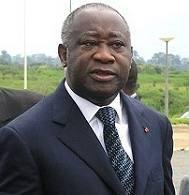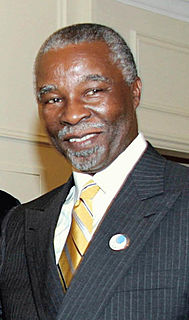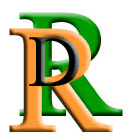
The Rally of the Republicans is a liberal party in Ivory Coast. The party is the country's governing party; the party's leader, Alassane Ouattara, is the current President of Ivory Coast.

The First Ivorian Civil War was a conflict in the Ivory Coast that began in 2002. Although most of the fighting ended by late 2004, the country remained split in two, with a rebel-held Muslim north and a government-held Christian south. Hostility increased and raids on foreign troops and civilians rose. As of 2006, the region was tense, and many said the UN and the French military failed to calm the civil war.
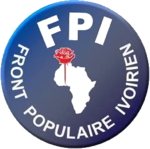
The Ivorian Popular Front is a centre-left, democratic socialist and social democratic political party in Ivory Coast.

The United Nations Operation in Côte d'Ivoire(UNOCI)(French: Opération des Nations Unies en Côte d'Ivoire, ONUCI) was a peacekeeping mission whose objective was "to facilitate the implementation by the Ivorian parties of the peace agreement signed by them in January 2003". The two main Ivorian parties here are the Ivorian Government forces who control the south of the country, and the New Forces, who control the north. The UNOCI mission aims to control a "zone of confidence" across the centre of the country separating the two parties. The Head of Mission and Special Representative of the Secretary-General is Aïchatou Mindaoudou Souleymane from Niger. She has succeeded Bert Koenders from the Netherlands in 2013 who himself succeeded Choi Young-jin from South Korea in 2011. The mission officially ended on 30 June 2017.
Opération Licorne was the name of the French Armed Forces's peacekeeping operation in support of the United Nations Operation in Côte d'Ivoire. The French forces have been stationed in the country since shortly after the outbreak of the Ivorian Civil War. The troops' main mission was to support the United Nations peacekeeping mission and to ensure the security of French and foreign nationals.

Simone Ehivet Gbagbo is an Ivorian politician. She is the President of the Parliamentary Group of the Ivorian Popular Front (FPI) and is a Vice-President of the FPI. As the wife of Laurent Gbagbo, the President of Côte d'Ivoire from 2000 to 2011, she was also First Lady of Ivory Coast prior to their arrest by pro-Ouattara forces.

Presidential elections were held in Ivory Coast in 2010. The first round was held on 31 October, and a second round, in which President Laurent Gbagbo faced opposition leader Alassane Ouattara, was held on 28 November 2010. Originally scheduled to be held in 2005, the vote was delayed several times due to the Ivorian Civil War and difficulties involved in the organization and preparation of the elections. A peace agreement between the government and the former rebel New Forces was signed on 4 March 2007, and in late April 2009, it was announced that the elections would be held by 6 December 2009, and that the date would be announced shortly. On 15 May 2009, the date was announced to be 29 November 2009. On 11 November, the elections were postponed again due to delays in the electoral roll. It was announced on 3 December 2009 to be held in late February or early March 2010.

A parliamentary election was held in Ivory Coast on 11 December 2011, after the presidential election which was held in late 2010. This followed a peace agreement between the government and the New Forces that was signed in March 2007. The Rally of the Republicans, the party of President Alassane Ouattara, won just under half the seats in the National Assembly.

The 2010–11 Ivorian crisis was a political crisis in Ivory Coast which began after Laurent Gbagbo, the President of Ivory Coast since 2000, was proclaimed the winner of the Ivorian election of 2010, the first election in the country in 10 years. The opposition candidate, Alassane Ouattara, and a number of countries, organisations and leaders worldwide claimed Ouattara had won the election. After months of attempted negotiation and sporadic violence, the crisis entered a decisive stage as Ouattara's forces began a military offensive in which they quickly gained control of most of the country and besieged key targets in Abidjan, the country's largest city. International organizations have reported numerous human rights violations, and the UN undertook its own military action with the stated objective to protect itself and civilians.
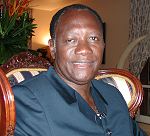
United Nations Security Council Resolution 1962, adopted unanimously on December 20, 2010, after recalling previous resolutions on the situation in Côte d'Ivoire, including resolutions 1893 (2009), 1911 (2010), 1924 (2010), 1933 (2010), 1942 (2010), 1946 (2010) and 1951 (2010), the Council extended the mandate of the United Nations Operation in Côte d'Ivoire (UNOCI) until June 30, 2011 and urged all Ivorian parties to respect the outcome of the presidential election and the recognition of Alassane Ouattara as President.

United Nations Security Council Resolution 1975, adopted unanimously on March 30, 2011, after recalling previous resolutions on the situation in Côte d'Ivoire, including resolutions 1572 (2004), 1893 (2009), 1911 (2010), 1924 (2010), 1933 (2010), 1942 (2010), 1946 (2010), 1951 (2010), 1962 (2010), 1967 (2011) and 1968 (2011), the Council demanded that Laurent Gbagbo step down as President and imposed sanctions on him and his close associates.

Désiré Asségnini Tagro was an Ivorian politician who served as the Minister of the Interior and chief of staff for Ivorian President Laurent Gbagbo during the 2010–2011 Ivorian crisis. Tagro was a top ally of Gbagbo.
The following lists events that happened during 2005 in Ivory Coast.
The following lists events that happened during 2011 in Ivory Coast.

Presidential elections were held in Ivory Coast on 25 October 2015. Alassane Ouattara won a second term in a landslide victory over his closest rival Pascal Affi N'Guessan.


